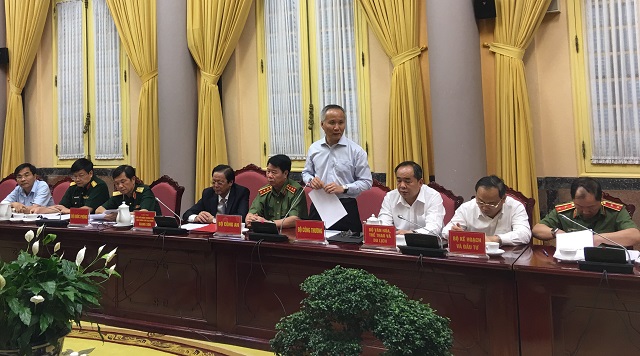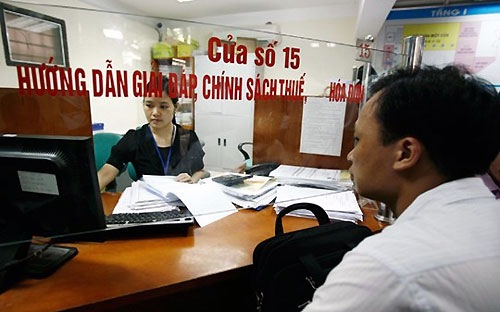On the morning of June 28, the President's Office held a press conference to announce the Presidential Order regarding the promulgation of laws recently passed by the 14th National Assembly in its 5th session.

Deputy Minister of Industry and Trade Tran Quoc Khanh discusses the amended Competition Law on June 28 at the Office of the President.
Chief of the Office of the President Giang Son announced the Order of the President on the promulgation of 7 laws, including: the National Defense Law; the Competition Law; the Law on Denouncement; the Law amending and supplementing some articles of the Law on Physical Education and Sports; the Law on Measurement and Mapping; the Cybersecurity Law; and the Law amending and supplementing some articles of 11 laws related to planning.
Discussing the amended Competition Law, Mr. Tran Quoc Khanh, Deputy Minister of Industry and Trade, stated that the Competition Law, first enacted in 2004, marked an important milestone by establishing a unified legal framework for enterprises' competitive activities in the market. This law has become a crucial tool for the state to control anti-competitive behaviors.
However, after more than 12 years in effect, with changing socio-economic conditions as well as the legal environment and trends of international economic integration, the 2004 Competition Law has shown limitations and inadequacies. Therefore, the Draft of the amended Competition Law was included in the National Assembly's amendment program and was approved by the 14th National Assembly in its 5th session.
Compared to the 2004 Competition Law, the new competition law has been built on a close integration of economic and legal thinking. It emphasizes the goal of enhancing enforcement efficiency and introduces significant amendments and supplements aimed at maximizing respect for the freedom of enterprise, respecting normal business activities in a market economy, while providing appropriate management to ensure a healthy competitive environment.
Mr. Khanh highlighted some new points of the 2018 Competition Law.
Firstly, the scope of regulation and the subjects of application have been expanded. The law regulates both anti-competitive behaviors and economic concentrations that have or may have anti-competitive effects on the Vietnamese market, regardless of whether these behaviors occur within or outside Vietnam.
Expanding the scope of regulation aims to create a legal corridor to comprehensively investigate and handle all anti-competitive behaviors that negatively impact Vietnam's competitive environment. This legal basis is crucial for effective enforcement.
Additionally, it establishes a legal foundation for Vietnam's competition authorities to cooperate with competition authorities from other nations and territories in investigating and handling anti-competitive cases, facilitating the implementation of competition commitments made by Vietnam in trade agreements. The new law also broadens the application scope to cover all entities potentially violating competition law.
Secondly, the law has amended, supplemented, and clarified prohibited behaviors for state agencies. This extends the principles of the 2004 Competition Law, with additional behaviors prohibited for state agencies. State agencies are strictly prohibited from engaging in certain activities that hinder market competition.
This regulation is essential because the power granted to state agencies is exceptionally special, allowing potential misuse to disrupt market competition. State agencies are unique subjects under competition law, thus necessitating specific regulations governing their activities.
Thirdly, the completion of regulations on controlling anti-competitive agreements and the introduction of leniency policies to enhance enforcement efficacy. The regulations on anti-competitive agreements have been revised and supplemented towards expansion and change in approach. Previously, anti-competitive agreements were prohibited based on specific criteria like the combined market share of participating enterprises. The new competition law, however, evaluates impact or potential impact on competition restrictions. Additionally, leniency policies are introduced to enhance the discovery and investigation of covert anti-competitive agreements.
Fourthly, additional criteria for determining significant market power have been included to identify enterprises and groups of enterprises holding dominant market positions. Besides market share, other factors are considered to identify those with significant market power, aiming for accurate assessment of market strength and competitive realities.
Fifthly, fundamental changes in the approach to enhancing regulations on economic concentration control. Economic concentration, such as mergers, is considered a business right. The law no longer rigidly prohibits economic concentration based on combined market share. Previously, if two enterprises merged to hold over 50% market share, it was banned. The new law respects business freedom, viewing mergers and acquisitions as natural market activities.
However, the Competition Commission will review and evaluate significant anti-competitive impacts. Should impacts be significantly restrictive, appropriate measures will restore market competition. If positive impacts outweigh negative ones, economic concentration is allowed.
This forward-thinking regulation respects enterprises' right to use economic concentration to develop their business. The state intervenes only when economic concentration poses a threat to national competition.
Sixthly, the law has perfected regulations on controlling unfair competitive practices. To ensure legal consistency, the law does not continue to prescribe certain unfair practices already covered by other laws, asserting that such behaviors should follow the specific laws of respective sectors.
Seventhly, reorganization of the competition authority. The law establishes a national competition authority by reorganizing the competition bodies stipulated in the 2004 Competition Law, merging the current Competition Administration Department with the Competition and Consumer Protection Council and its Office. This significant change aims to enhance enforcement efficiency.
The law specifically outlines the functions, tasks, and authority of the National Competition Commission to ensure its independence. The Commission serves both as a state management and quasi-judicial body, managing state policy while investigating and handling anti-competitive cases.
Regarding litigation, Mr. Khanh explained that this aspect is entirely independent. Commission members dealing with anti-competitive cases, appointed by the Prime Minister, solely adhere to the law, not directed by the Minister of Industry and Trade or the Commission's Chairman.
Eighthly, the law has streamlined procedural regulations in competitive litigation, shortening timelines, and clarifying procedural phases and responsibilities in handling anti-competitive cases.
 Article table of contents
Article table of contents





.Medium.png)
.Medium.png)
.Medium.png)
.Medium.png)
